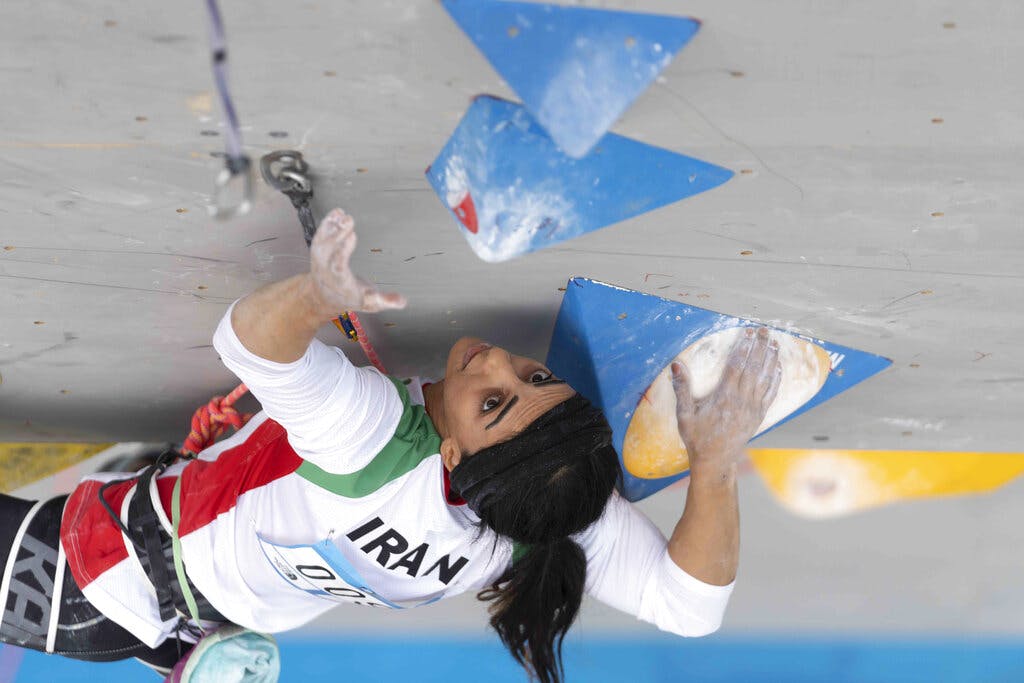To Help Iranian Rebels, Halt All Diplomacy With Their Oppressors
A closed-door meeting at the United Nations is called to discuss the articles of appeasement over the 2015 nuclear deal, but no snapback expected.

While America and allies do little beyond grandstanding to help liberty-craving Iranians, the month-long revolution intensifies; new heroes and heroines of the anti-Islamic Republic uprising emerge almost daily even as a solidified leadership is yet to be identified.
This is the context in which America, Britain, and France convened a closed-door consultation today at the United Nations Security Council to discuss the 2015 resolution that endorsed the nuclear deal Tehran made with the council’s five permanent members and Germany.
The Western allies accuse the Islamic Republic of violating that resolution, known as 2231, by selling kamikaze drones to Russia for use against Ukraine. Diplomats are telling the Sun, however, that while the three permanent council members want to convey their concerns about Iran’s violation, they do not consider the drone sale to Russia a “material breach.”
Such a breach would have allowed each of the resolution’s signatories to trigger a mechanism, known as “snapback,” which would void the nuclear agreement. America and its allies, in other words, still cling to the fiction that diplomacy over Iran’s nuclear arsenal remains viable, even as talks about it have been frozen for months, and as the Iranian regime teeters under a nationwide rebellion.
On Friday, when the Security Council plans to discuss Ukraine publicly, ambassadors from the three Western countries are likely to condemn the Iranian violation. Yet, as far as Iranian rebels are concerned, the most significant show of support for their cause would be an announcement that America and others no longer consider the Islamic Republic a worthy partner for the kind of diplomacy that would enrich the mullahs.
The rebels, entering the fifth week of an uprising, show no sign of fatigue. The case of Elnaz Rekabi, the latest heroine to emerge in the as-yet-leaderless revolt, is emblematic of the progress of the revolution.
The saga of the wall-scaling Ms. Rekabi, an athlete whose ponytail proudly waived for all to see while she represented Iran in a climbing competition in South Korea, is getting curiouser and curiouser: Is she part of the anti-hijab movement, or isn’t she?
Publicly, Ms. Rekabi is swearing up and down that her hijab-less performance, which went viral on social media, was unintentional. Ms. Rekabi claims she did not mean to defy the Islamic Republic’s law forcing all women and girls — especially those representing the country in international competitions — to cover their hair according to the regime’s interpretation of propriety.
Ms. Rekabi stated on her Instagram page and in televised interviews on regime-controlled channels that while rushing to make her now-famous wall climb, she forgot to don the mandatory hijab. Her comments had all the hallmarks of forced confession in a hostage video.
According to some reports, Ms. Rekabi’s brother, Davoud, had been arrested by the Revolutionary Guards. The BBC Persian service had reported that Ms. Rekabi’s friends had lost touch with her once she entered the Iranian embassy at Seoul after her competition ended.
When she finally arrived yesterday at the Tehran airport, she received a hero’s welcome from hundreds of admirers. Ignoring Ms. Rekabi’s about-face, the rebels who have made opposition to the forced hijab law central to their anti-regime revolution are cheering her. Intentionally or not, she symbolizes the revulsion that an increasing number of Iranians feel toward their oppressive, cruel regime.
The revolution is far from victimless. Regime enforcers are becoming ever more aggressive as they attempt to put down the insurrection. Two high school girls died today, the latest casualties. At Evin prison, where the regime incarcerates its opponents, details are slowly emerging of an uprising in which inmates set the place on fire. At least four people were killed and 61 injured.
Rights groups report that some 240 protesters, including 32 minors, have been killed during the month since 22-year old Mahsa Amini died in custody. She perished after she was arrested by the morality police for wearing her hijab improperly. Since then, more than 8,000 people have been arrested in 111 cities and towns.
These numbers are based on sketchy reports and are likely much higher, as the regime has shut down most forms of communication. Internet blackouts help enforcers keep the revolution decentralized. One reason the revolution produces almost daily heroes — from Amini and others who were killed for the right to choose their dress code, to Ms. Rekabi — is that as yet no central figure has emerged as the uprising’s leader.
“Many of the leaders are in jail or under house arrest,” a veteran of the hijab revolt, the Iranian-American Masih Alinejad, told the Sun. Different groups are attempting to coordinate activities, she added. “Let’s remember: Khomeini did not emerge as the leader in November 1978, only two months before the Shah departed. We are at an early stage of our revolution.”
To help, America could intensify efforts to equip the rebels with the means to communicate and coordinate among themselves. Most importantly, more than meek statements are needed to show the protesters that America has their backs.
Iran’s violation of a UN resolution that enshrined the 2015 nuclear deal in international law is certainly a good opportunity to show that America prefers the rebels to the mullahs. The time has come to cut off all diplomacy with the Islamic Republic.

